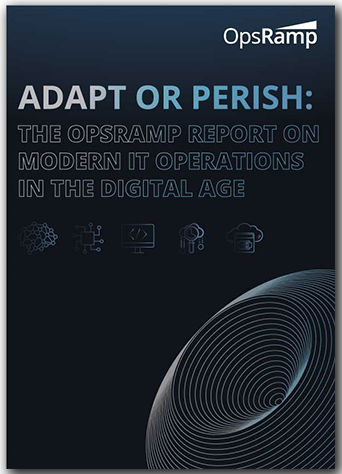
Traditional IT operations challenges, like conflicts between Dev and Ops, siloed teams, and reactive incident management, are roadblocks to success in a digital world. In a new report called “Adapt or Perish: The OpsRamp Report on Modern IT Operation in the Digital Age,” OpsRamp set out to determine what factors prevent IT teams from embracing modernization and how to overcome them.
The report found that 86% of enterprises have more than a quarter of their infrastructure running in the cloud. Sixty percent of them have over half of their mission-critical workloads there. This is consistent with Gartner’s 2018 prediction that 80% of enterprises would shut down their traditional datacenters by 2025.
According to OpsRamp, adoption of cloud service and cloud native practices for building applications will require an overhaul of traditional IT operations practices.
OpsRamp believes that IT teams will need to gain new skills, knowledge, and capabilities to thrive in hybrid infrastructures. Sixty-four percent of respondents felt that DevOps was the most sought-after new skill. Trailing behind are cloud certifications, machine learning, and industry knowledge. According to OpsRamp, once organizations adopt DevOps, they can release applications faster and deliver continuous improvements with lower failure rates.
In addition to the need for new skills, budgets are a limiting factor to digital transformation. What ends up happening, OpsRamp explained, is that IT teams are asked to do more with less and that results in a mismatch between corporate goals and existing technology capabilities.
“The OpsRamp Report on Modern IT Operations in the Digital Age identifies the challenges that many of our customers are experiencing,” said Varma Kunaparaju, CEO of OpsRamp. “Enterprises want agility, flexibility, control, and the power and promise of the cloud. OpsRamp’s service-centric AIOps platform helps monitor and manage data volume and velocity, and provides these companies with a digital operations command center that allows modern IT operations teams to be more adaptive, unified, and aligned across a hybrid, multi-cloud landscape. What’s more, our native infrastructure monitoring and service context capabilities help maintain business service uptime while reducing the risk of surprise outages.”
OpsRamp surveyed 250 respondents that worked either as an IT manager, or a higher level position in IT teams.








